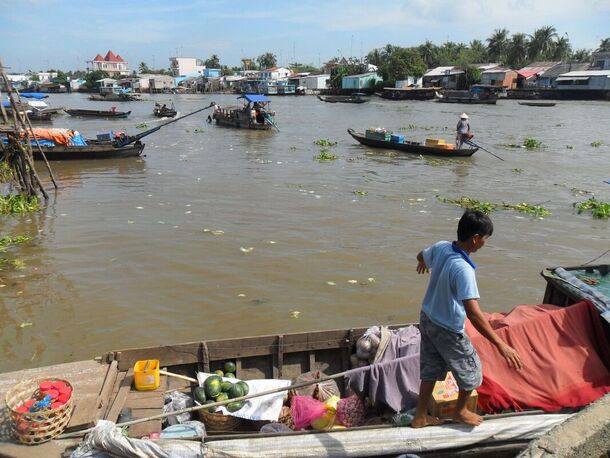Delta Negative: The Mekong Delta and Climate Change’s Neglected Consequences in Data-Sparse Regions11/19/2019 by Ethan Thio '22 Edited by Elana Balch '21.5 Climate deniers have weaponized the unknown in an effort to discredit climate change. Opponents of climate legislation sow doubt and “manufacture uncertainty” to create the perception that the science is unclear and the potential effects of climate change are uncertain (Dryzek 146). This uncertainty is a shield, because deniers can argue that the unknown realities of climate change make climate change more benign than scientists and advocates believe. In truth, this line of reasoning is flawed because in many cases, the once-unknown only bolsters the scientific consensus. In an article published in Nature Communications, researchers analyzed the Mekong Delta, an area of land made of river sediment deposit in Vietnam. The Mekong Delta is heavily populated, and a chief concern is the effect of climate change on the lives and livelihoods of those living there. The Mekong Delta, along with other low elevation areas near bodies of water, are especially vulnerable to sea level rises associated with climate change, and assessing and mitigating these risks are critical to protect the inhabitants of these regions. Researchers have created predictive models which attempt to forecast the effects of future rises in sea level on the Mekong Delta. However, detailed data regarding the topography and elevation of the delta is limited, forcing researchers to use imprecise data such as low resolution satellite imagery as the backbone of their models. These coarse measurements generally reported the Mekong Delta’s mean elevation to be 2.6 meters above sea level. The researchers behind the Nature Communications article used more accurate elevation data once only available to the Vietnamese government to create a new model that can better assess the impact of sea level rise on the region. This model, which the researchers call Topo DEM (Digital Elevation Model) and the new data used showed that the mean elevation of the Mekong data is actually only 0.82 meters above sea level. The impact of these findings on a regional level is significant. Lower elevations mean that rising sea levels associated with climate change will have a more immediate effect on the delta, with more areas now vulnerable to flooding. The risk isn’t only in periodic floods, but permanent inundation of delta land, as the sea encroaches further onto the delta itself. Additionally, efforts to mitigate these rising sea levels have been initiated with the older timescale and higher elevations in mind, meaning that they may be too late or insufficient to contend with the realities of sea level rise in the near future. According to the article in Nature Communications, over 12 million people in the region live in areas that will fall below sea level following a sea level rise of only one meter, endangering their lives and livelihoods. Falling below sea level and experiencing flooding may not have the shock value of a tsunami or other natural disaster, but it has absolutely devastating effects. Apart from the inescapable property damage and loss of productivity, floods can damage sources of groundwater, lead to the spread of waterborne disease, and destroy critical infrastructure that can endanger lives. As such, this lower elevation isn’t a meaningless statistic, but one that has direct implications on millions of lives. In a broader sense, these new findings cast a degree of doubt on predictive models created in other data-sparse, vulnerable regions of the world. It’s entirely possible that other regions are in worse shape than we realize, and in order to develop meaningful, timely responses to these risks, more accurate data is necessary. Uncertainty can be weaponized to discredit climate change, but it can also obscure some of climate change’s most devastating consequences. Governments and researchers must challenge uncertainty, not just to respond to climate deniers, but also to more effectively address the looming and unknown perils that climate change may present. Works Cited: Dryzek J. S., Norgaard, R. B., & Schlosberg, D. Oxford Handbook of Climate Change and Society. Oxford: Oxford University Press; 2014 Minderhoud, P. S. J., Coumou, L., Erkens, G., Middelkoop, H., & Stouthamer, E. (2019). Mekong delta much lower than previously assumed in sea-level rise impact assessments. Nature Communications. (2019); 10(1). What are the consequences of floods? [Internet] [2018, June 12]. Retrieved October 4, 2019, Available from https://www.chiefscientist.qld.gov.au/publications/understanding-floods/flood-consequences.
0 Comments
Leave a Reply. |

